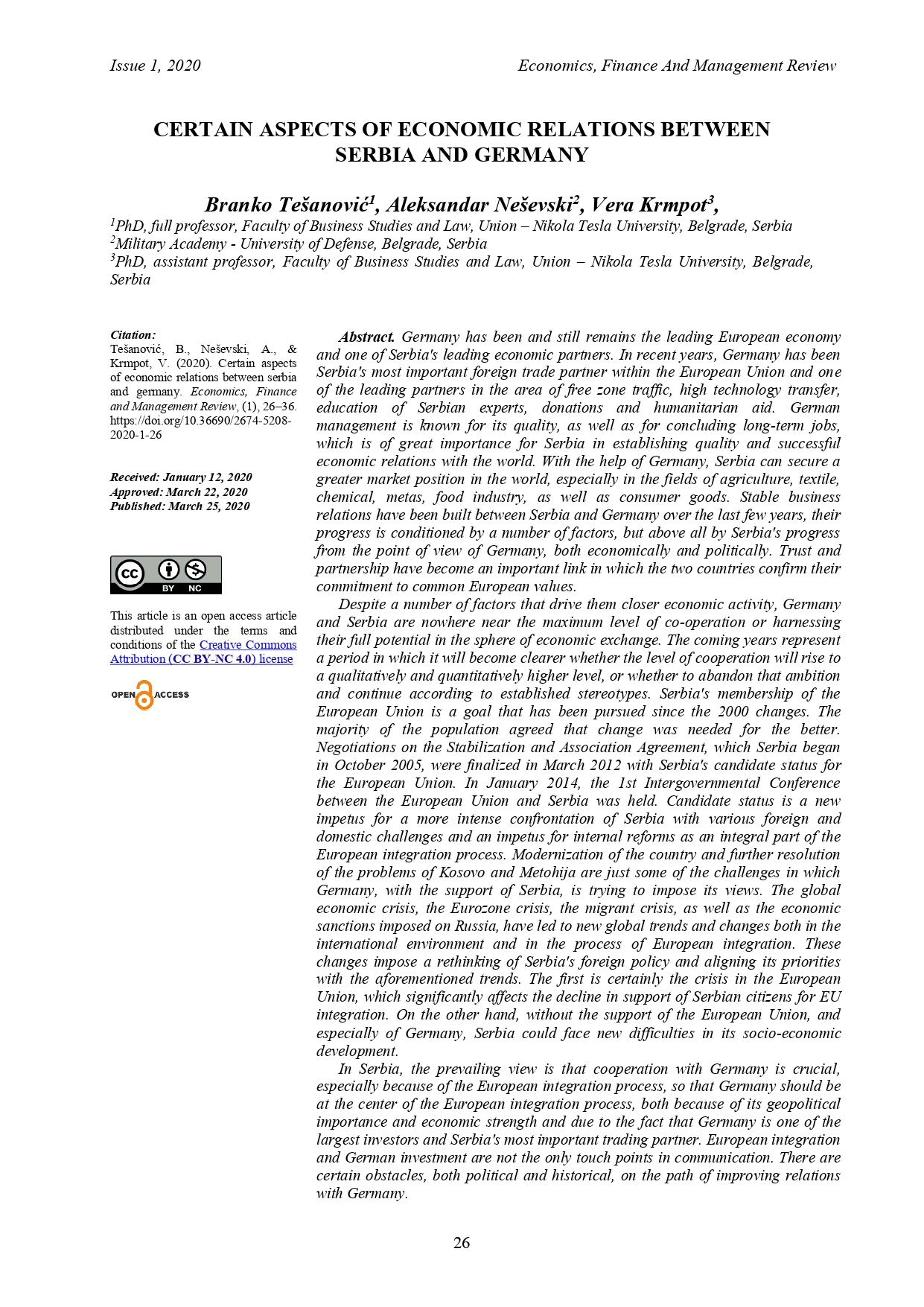CERTAIN ASPECTS OF ECONOMIC RELATIONS BETWEEN SERBIA AND GERMANY
DOI:
https://doi.org/10.36690/2674-5208-2020-1-26Keywords:
economic relations, Serbia, Germany, foreign trade partnership, German investments, placementAbstract
Germany has been and still remains the leading European economy and one of Serbia's leading economic partners. In recent years, Germany has been Serbia's most important foreign trade partner within the European Union and one of the leading partners in the area of free zone traffic, high technology transfer, education of Serbian experts, donations and humanitarian aid. German management is known for its quality, as well as for concluding long-term jobs, which is of great importance for Serbia in establishing quality and successful economic relations with the world. With the help of Germany, Serbia can secure a greater market position in the world, especially in the fields of agriculture, textile, chemical, metas, food industry, as well as consumer goods. Stable business relations have been built between Serbia and Germany over the last few years, their progress is conditioned by a number of factors, but above all by Serbia's progress from the point of view of Germany, both economically and politically. Trust and partnership have become an important link in which the two countries confirm their commitment to common European values.
Despite a number of factors that drive them closer economic activity, Germany and Serbia are nowhere near the maximum level of co-operation or harnessing their full potential in the sphere of economic exchange. The coming years represent a period in which it will become clearer whether the level of cooperation will rise to a qualitatively and quantitatively higher level, or whether to abandon that ambition and continue according to established stereotypes. Serbia's membership of the European Union is a goal that has been pursued since the 2000 changes. The majority of the population agreed that change was needed for the better. Negotiations on the Stabilization and Association Agreement, which Serbia began in October 2005, were finalized in March 2012 with Serbia's candidate status for the European Union. In January 2014, the 1st Intergovernmental Conference between the European Union and Serbia was held. Candidate status is a new impetus for a more intense confrontation of Serbia with various foreign and domestic challenges and an impetus for internal reforms as an integral part of the European integration process. Modernization of the country and further resolution of the problems of Kosovo and Metohija are just some of the challenges in which Germany, with the support of Serbia, is trying to impose its views. The global economic crisis, the Eurozone crisis, the migrant crisis, as well as the economic sanctions imposed on Russia, have led to new global trends and changes both in the international environment and in the process of European integration. These changes impose a rethinking of Serbia's foreign policy and aligning its priorities with the aforementioned trends. The first is certainly the crisis in the European Union, which significantly affects the decline in support of Serbian citizens for EU integration. On the other hand, without the support of the European Union, and especially of Germany, Serbia could face new difficulties in its socio-economic development.
Downloads
References
Avramov, S., Kreća M.D (1993): Međunarodno javno pravo, Zavod za udžbenike i nastavna sredstva, Beograd [in Serbian].
Stepanov, R., Despotović, Lj, (2002): Evropska unija -nastanak, institucije, pravo, NATO, Stylos, Beograd [in Serbian].
Kragulј, D., Milićević, D., (2005): Ekonomija, Uvod u ekonomsku analizu, Narodna knjiga, Beograd [in Serbian].
Dašić, D. (2007): Principi internacionalne ekonomije, Univerzitet Braća Karić, Beograd [in Serbian].
Salvatore, D. (2009): Centar za izdavačku delatnost, Ekonomski fakultet, Beograd [in Serbian].
New Standards (Нови Стандард): Official site Retrieved from: http://standard.rs [in Serbian].
Ministry of European Integration of the Government of the Republic of Serbia: Official site. Retrieved from: https://www.mei.gov.rs [in Serbian].
Republican Pension and Disability Insurance Fund of the Republic of Serbia: Official site. Retrieved from: http://pio.rs [in Serbian].
Statistical Office of the Republic of Serbia: Official site. Retrieved from: http://webrzs.stat.gov.rs [in Serbian].

Downloads
Published
How to Cite
Issue
Section
License

This work is licensed under a Creative Commons Attribution-NonCommercial 4.0 International License.








